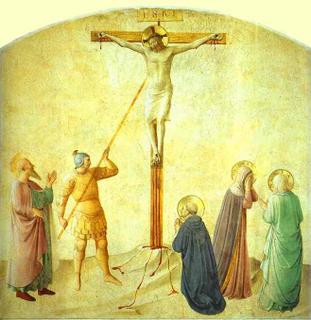 "This radical sharing of the human condition, with the exception of sin (see Hebrews 4:15), leads Jesus to that frontier which is the sign of our finiteness and frailty, death. However, the latter is not the fruit of a dark mechanism or blind fatality: It is born from the choice of obedience to the Father's plan of salvation (see Philippians 2:8).
"This radical sharing of the human condition, with the exception of sin (see Hebrews 4:15), leads Jesus to that frontier which is the sign of our finiteness and frailty, death. However, the latter is not the fruit of a dark mechanism or blind fatality: It is born from the choice of obedience to the Father's plan of salvation (see Philippians 2:8). "The Apostle adds that the death Jesus faces is that of the cross, namely, the most degrading, thus wishing to be truly a brother of every man and woman, including those constrained to an atrocious and ignominious end.
"But precisely in his passion and death Christ attests to his free and conscious adherence to the will of the Father, as one reads in the Letter to the Hebrews: "Although he was a Son, he learned obedience through what he suffered" (Hebrews 5:8).
"Let us pause here in our reflection on the first part of the Christological hymn, focused on the Incarnation and redemptive Passion. We will have the occasion later on to reflect more deeply on the subsequent itinerary, the paschal, which leads from the cross to glory. The fundamental element of this first part of the hymn, it seems to me, is the invitation to penetrate into Jesus' sentiments.
"To penetrate into Jesus' sentiments means not to consider power, wealth and prestige as the highest values in life, as in the end, they do not respond to the deepest thirst of our spirit, but to open our heart to the Other, to bear with the Other the burden of life and to open ourselves to the Heavenly Father with a sense of obedience and trust, knowing, precisely, that if we are obedient to the Father, we will be free. To penetrate into Jesus' sentiments -- this should be the daily exercise of our life as Christians."
--from the Wednesday audience, 1 June 2005

No comments:
Post a Comment